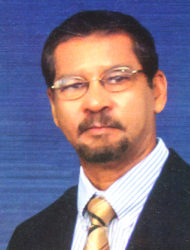With GBTI registering an after-tax profit of slightly over $2 billion for 2015 in what was described as a challenging environment, the bank’s Chairman Robin Stoby says that government’s fiscal policy has a crucial role to play in boosting economic growth.
In his Chairman’s report which was read at the Guyana Bank for Trade and Industry’s (GBTI) 2015 Annual General Meeting at its Kingston head office on June 2nd, Stoby noted that during the year, the bank had functioned in a challenging economic environment underscored by uncertainty over the economic policy direction of the APNU+AFC administration, falling international commodity prices and the loss of the key Venezuelan rice market among other problems.

He noted, however, that this had been compensated for by higher output in the gold and rice sectors. Stoby adverted to the presentation of the 2016 budget in January for the first time in decades and the projection of economic growth of around 4%.
He continued: “The new Government has alluded to its limited fiscal space but it does not need reminding that fiscal policy has an important role to play in delivering stronger economic growth, for example in supporting diversification strategies that promote higher local value added activities. In the same manner the country needs to focus resources on infrastructure improvement and improving all weather road access to key productive areas in the country such as mining and agriculture.”
The Chairman pointed out that while loans to the private sector grew by 6.2% last year the increasing level of non-performing loans was a cause for concern and led to an increased provisioning expense. The bank’s accounts showed that loan provisioning rose sharply from $176 million in 2014 to $620 million last year.
Stoby said that it is expected that as the 2016 budgetary provisions work their way into the economy “a more positive economic attitude will prevail in the country to the advantage of the private sector and the community as a whole.”
Adverting to the 2015 amendments to the anti-money laundering legislation (AML), Stoby said “Despite the fact that members of the public have reported a frustrating delay in the completion of business transactions at the commercial banks caused by the more rigorous application of the AML regulatory requirements, it is important for us all to appreciate the significance of these measures that are intended to protect all banking customers…”
Pointing to the risk of data theft, Stoby said the bank had put in place strong risk mitigation measures for both customers and staff and said he hoped that in the near future there would be a wider suite of technological innovations.
He lauded the government’s announcement that the Bank of Guyana would be conducting a feasibility study on implementing deposit insurance as a means of protecting clients from losses in the case of bank failure.

In his report, Chief Executive Officer (CEO) John Tracey said the uncertainty in the first half of last year created uncertainty in the investment climate and led to banks facing serious challenges in maintaining the quality of their assets and accessing “sound revenue generating activity”.
The bank’s loan portfolio was $48 billion at the end of 2015. This was $3.3 billion over the level at the start of the year which Tracey said was a modest growth of 7.4% when compared with recent years. Fifty per cent of the loans were to the services sector. Households was next with 24%. Exposure to the agriculture sector was 12% and 8% to the manufacturing sector.
He voiced concern that the agriculture sector – mainly rice and cane farming are victims of falling world market prices and said that significant interventions may be needed to see them through a difficult period.
Tracey said that while deposits grew marginally at the end of the year by 2.5% to $82.3 billion, the growth was moderated by significant withdrawals at the end of the year by institutional investors which held time deposits.
Pointing out that like many organisations here, GBTI was still a predominantly paper-based operation, Tracey said that GBTI has started an initiative to digitalise its archival information and customer documents. This will be fully functional this year, he said.
The CEO said that GBTI Property Holdings was established as a wholly-owned subsidiary to own properties and engage in gold trading. The company owns the Port Kaituma branch building and two properties in Georgetown. At the end of 2015, the company recorded a loss as a result of a write down of the gold stock on hand. However, Tracey said in February this year the gold stock was sold as the prices recovered and the company is currently profitable. Gold trading is offered at Bartica and Port Kaituma.
Tracey projected a difficult year ahead.
“International markets are very volatile and geo-political risks are very high. Guyana is no longer as immune to financial turbulence as before. Our commodity-based economy will face shocks as commodity prices continue to slide.
“Caribbean banks are faced with the latest phenomenon of `de-risking’ where we are losing valuable correspondent banking relationships in the developed world. This has dire consequences for banks in the region and our ability to conduct international trade,” he stated.
The after-tax profit of just over $2 billion for the year ended December 31, 2015 was slightly lower than in the previous year.
The company’s financial statements showed that the after-tax profit for last year was $2.012 billion compared to $2.117 billion in 2014.
Interest income rose to $5.6 billion in 2015 compared to $5.3 billion in 2014. The interest expense increased from $895 million in 2014 to $906 million last year. Net interest income in 2015 was $4.7 billion compared to $4.4 billion in 2014. Operating expenses appreciated from $2.6 billion in 2014 to $2.8 billion in 2015. Taxation was significantly lower. The figure in 2014 was $875 million while the taxation amount in 2015 was $673 million.
Basic earnings per share was 50.31 in 2015 compared to 52.93 in 2014. Total dividends paid for 2015 was $17 per share, consistent with last year.





